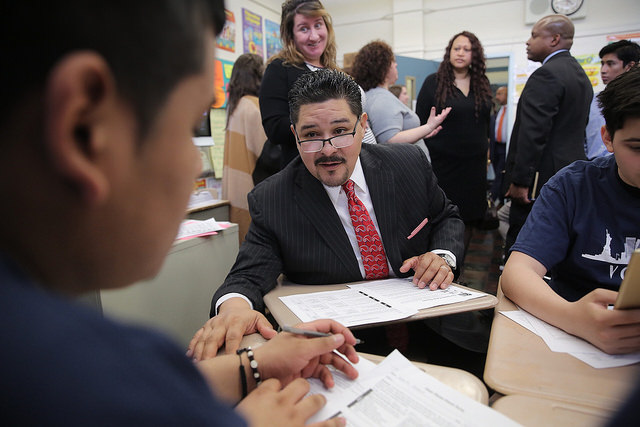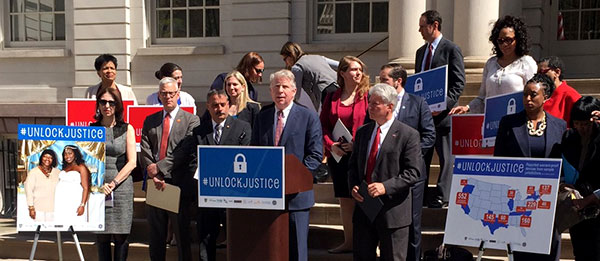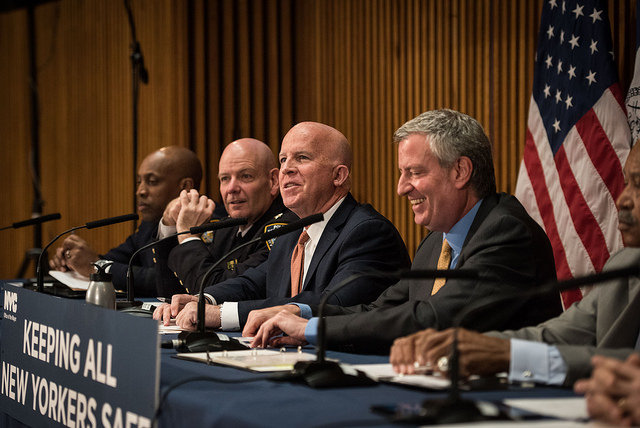A Chance for Chancellor Carranza to Restore Teacher Trust

Schools Chancellor Carranza (photo: New York City Council)
I read a lot of stories about the perfidy of teachers. We aren’t perfect. Like in every line of work, some among us do bad things. Often we’re stereotyped for the actions of a few. Despite the frequent and excellent reporting of Sue Edelman in The New York Post, most people don’t know much about administrative malfeasance, however, which exists from school level right up to Tweed Courthouse, home of the Department of Education’s top staff.
Let’s say my principal wakes up one morning and decides I’m an awful pain in the neck. In fact, he wouldn’t be wrong. (If he were, I probably wouldn’t be doing my job as a teachers union chapter leader.) While we can get along well under many circumstances, when teachers are in trouble, our relationship turns adversarial. It’s my job to defend our contract, and thereby our members. But it’s not always an easy task.
Let’s say my principal claims I threw a cheeseburger at a student. We could meet, and I would tell him I did not, in fact, throw the cheeseburger. There was no cheeseburger and there is no evidence there ever was a cheeseburger. This notwithstanding, the principal could place a letter in my file stating I threw a cheeseburger. He could also state that if there were any more flying cheeseburgers, I’d face further disciplinary action, up to and possibly including termination.
Let’s say the principal focuses on something that actually did happen, but has a lot of room for interpretation, like many actions. Perhaps I said good morning to a security guard and the guard did not like the way I looked at him when I did it. The principal could do an investigation (or not) and conclude that I did, in fact, say good morning. The principal could conclude that I looked at the security guard with some negative aspect, or at least the security guard believes I looked at him with a negative aspect.
That’s another letter in my file. That’s another threat to my livelihood. Aside from writing a response and attaching it to the letter, there would be nothing I could do about it. You won’t read this in the tabloids, but under our contract, members of the United Federation of Teachers (UFT) are not permitted to grieve, or appeal, letters in their files. It doesn’t matter if they are false, and it doesn’t matter if they are ridiculous beyond belief. The principal decides you are guilty, and that’s pretty much it.
If I continue to say “good morning” with that perceived awful look in my eye, it’s entirely possible I could face dismissal. When a principal moves to dismiss a teacher, we go before an arbitrator for a hearing. Granted, it’s unlikely an arbitrator would have me fired for saying “good morning” with a look, whether or not there actually is one. But it’s likely a principal who wrote accusations like that would scrounge for every negative piece of information available. Were the arbitrator to leave me with a job, I’d likely get a fine and be found guilty of something less consequential. In that case, I’d likely be removed from my school and made a part of the Absent Teacher Reserve (ATR). ATR teachers generally rotate between schools covering for absent teachers.
Sometimes principals grow very weary of UFT activists. The chapter leader of Central Park East 1, along with a UFT delegate, was removed last year. Both faced charges that were ultimately deemed frivolous. Still, it was only when the entire community rose up, particularly a strong core of parents, that the charges were dismissed. I’m sad to say that activist school community is the exception rather than the rule. I’m sadder to say I know of many other principals who do similar things. Sometimes they are removed and sent off to do who knows what, as was the principal of CPE 1. Just as frequently, they keep their jobs, continue to harrass UFT members and drive morale straight into the toilet.
UFT members are permitted to grieve principal letters under certain very specific circumstances. If the occurrence is not reduced to writing within three months, that’s a grievance. This means if it’s June, and I supposedly threw the cheeseburger in September, I can’t get a letter to file about it now. If the school administration fails to meet with the subject of the letter and discuss it before issuing the letter, they aren’t permitted to place said letter in the teacher’s file. Also, if disciplinary charges do not follow, letters are removed after three years. If not, that’s a contractual violation.
In our building at Francis Lewis High School, we have outstanding grievances for all of the above. That’s because the Department of Education “legal” division, which I imagine as a bunch of children riding stick horses and shooting cap guns, routinely advises principals to ignore very plain contractual language.
At step one in the grievance process, we meet the principal, who informs us legal says whatever he or she is doing, whether or not it violates the contract, is OK. Then, at step two, we go to offices on Gold Street, where a chancellor’s representative presides over a hearing. They have 48 school days to write a decision, which amounts to two or three months, and often they can’t even make that deadline.
When chancellor’s representatives meet deadlines, we receive emails. Why wasn’t an incident reduced to writing within 90 days of occurrence, as required by the contract? Chancellor’s reps say things like, ‘this incident is not an occurrence, and therefore did not happen when you say it did.’ They may say an incident did not become an occurrence until the principal found out about it. Time stands still, evidently, before things reach the ears of a principal. I read this stuff and I feel like I’m through the looking glass.
Teachers are pretty stressed out under the best of circumstances. Faced with taking a day and going to a Manhattan hearing, some tell me they’re terrified and refuse to go. Others are nervous, but go anyway. I go along to try and reassure them. It’s hard, though, because I now know step two hearings are pretty much rigged and members will have to wait months for a decision, assuming there is one. I have to tell them this is just an exercise, and that we’ll have to wait for step three, arbitration, to get a fair hearing. This process can take over a year.
At least five grievances I’ve helped my colleagues write are heading to arbitration. Because these are blatant violations of contract, I expect we will win them all. But here’s the thing—arbitrators work for both the city and the union. They can’t rule one way all the time, or even nearly all the time. Assuming the arbitrators do the right thing and rule in our favor in these cases, what will happen in less obvious ones? If arbitrators try to be balanced, the city will have an edge in many cases.
I believe that’s exactly the game the city is playing. It’s a remnant of the teacher-hostile Bloomberg administration, and it’s there because Mayor de Blasio failed to clean house when he came into office. If new schools chancellor Richard Carranza wishes to turn around 16 years of bad faith, 16 years of bad morale, productive for neither teachers nor students, he’ll move quickly to turn this around. He’ll clean house at legal, and demand that all new hires actually read and respect the UFT contract.
***
Arthur Goldstein is an ESL teacher and UFT chapter leader for Francis Lewis High School. On Twitter @TeacherArthurG.
***
Have an op-ed idea or submission for Gotham Gazette? Email This email address is being protected from spambots. You need JavaScript enabled to view it.
Cy Vance and Jeff Sessions Versus Your Privacy

Manhattan DA Vance leads a press conference (photo: @NYPDnews)
As an elected member of the state Assembly, one of my main priorities is to ensure New Yorkers have a government that works with them to protect their rights and their safety. That’s why I’ve become increasingly concerned by the steps Manhattan District Attorney Cy Vance has taken to undermine digital privacy through his weak position on encryption protection.
Americans are rightfully worried about the confidentiality of their electronic information, from financial documents and medical records to simpler things like texts and emails. That fear is confirmed every time a major company or government agency has its system breached.
But DA Vance, along with President Trump’s Attorney General, Jeff Sessions, wants unfettered access to the data and information stored on our smartphones by forcing manufacturers to weaken the privacy protection technologies they’ve created and to install so-called “backdoors” into the devices.
What they want is the ability to bypass the encryption technology that allows only the sender and the recipient of a message - like a text - to see it. They argue that these backdoors will help law enforcement solve certain crimes, but the reality is the very small percentage of cases that could be helped is far eclipsed by the danger of weakening encryption for the rest of us.
They describe these backdoors as small, but in truth they are a wide-open front door for a hacker or foreign government to gain access to almost any smart phone in America. Vance and Sessions are naive if they believe that once a technology is created, only “good guys” will use it. Rogue hackers or hostile foreign governments will use the same tactics.
Vance and Sessions must look for real solutions that protect our privacy and do not involve undermining the security of our data.
***
Dan Quart is a member of the New York State Assembly representing Manhattan’s East Side. On Twitter @AMDanQuart.
***
Have an op-ed idea or submission for Gotham Gazette? Email This email address is being protected from spambots. You need JavaScript enabled to view it.
While Waiting on the State, Steps on Marijuana for the Mayor and NYPD

(Photo: Michael Appleton/Mayoral Photography Office)
Smoking marijuana in public will only be legalized if the New York State Assembly and Senate – huffing and puffing – change the penal law.
With no change, the real problem in New York City is the collateral consequences – past, present, and future – arrests for marijuana cause thousands of black and Hispanic New Yorkers disproportionately impacted by the NYPD’s approach. These consequences include issues when applying for a license or job, or leading to deportation proceedings as mandated by President Trump’s onerous immigration executive order.
These consequences could start to be mitigated if Mayor Bill de Blasio will “tell” – actually order – his police commissioner not to make misdemeanor marijuana arrests and instead directs the NYPD to issue a non-criminal summons when marijuana is smoked publicly. Additionally, de Blasio must enlist all five of the city’s district attorneys to decline criminal marijuana prosecutions – only the Manhattan and Brooklyn D.A.s have taken up this policy.
If the NYPD submits, a misdemeanor marijuana arrest will virtually be eliminated as a criminal charge, fingerprints will not be taken, nor sent to the FBI. For a non-criminal summons a fine can be paid by mail. This process would in essence decriminalize marijuana.
The proposed mayoral no-arrest policy – guaranteed to cause consternation at the NYPD’s highest level – will generate a reflex response that not making marijuana misdemeanor arrests is inconsistent with enforcing the law and it is Albany’s responsibility to change the law.
As he assigned a 30-day review of marijuana enforcement, de Blasio’s hopeful statement, “I respect the NYPD, which has proven the ability to innovate to come up with the how. I have a mandate for them, I’m convinced they will figure out how to act on it,” is unrealistic.
The mayor cannot really believe that the NYPD will voluntarily recommend “innovative” ideas – in 30 days – or significantly change its crime strategies of stopping, frisking, seizing marijuana, and arresting a person for smoking it in public, after 50-plus years of no progressive ideas for how to effectively address this issue.
The NYPD’s hazy and quick response after de Blasio’s announcement is hardly encouraging, “The (NYPD) 30-day Working Group on marijuana enforcement is underway, and this issue is certainly part of that review. The Working Group is reviewing possession and public smoking of marijuana to ensure enforcement is consistent with the values of fairness and trust, while also promoting public safety and addressing community concerns.”
There was a sleight of hand NYPD “reform” concerning marijuana arrests to ease the public pressure when stop-and-frisks were at all-time highs.
Since 2013, the NYPD, instead of criminally processing a person arrested, has often given a Desk Appearance Ticket – a misdemeanor criminal summons for public smoking – after a person is arrested, photographed, and fingerprinted, if there is no outstanding warrant for that person’s arrest. The only real DAT benefit is the person is not incarcerated for 10 or 20 or more hours waiting for a criminal court arraignment.
Annually, more than 15,000 individuals were arrested and charged with a misdemeanor, overwhelmingly receiving a DAT for smoking pot in public, and approximately 30,000 non-criminal summonses were issued for pot possession.
For these 45,000 New Yorkers and the hundreds of thousands before and after them, the collateral consequences for arrests and even for non-criminal summonses continue.
While legalization is debated the Legislature and the Governor must immediately enact an exemption to state law that currently mandates fingerprinting a person arrested for criminal possession of marijuana.
The Legislature and the Governor must specifically exclude from disclosure any pending or adjudicated marijuana arrest or non-criminal summons issued or asked about in any employment application for public service, a license or to obtain any public benefit.
While the mayor, the governor, and the Legislature dither about the legalization of marijuana, it is time for the mayor, after four-and-a-half years in office, to lead – and drag the NYPD along – to eliminate marijuana arrests, which will start to end the collateral consequences.
***
Arnold Kriss is a Manhattan attorney who formerly served as a Brooklyn Assistant District Attorney and Deputy Commissioner of Trials in the NYPD.
***
Have an op-ed idea or submission for Gotham Gazette? Email This email address is being protected from spambots. You need JavaScript enabled to view it.




